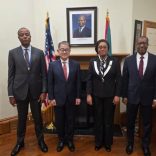Mozambique: Japan is crucial partner for structural projects – Finance Minister
Mozambique should aim to change its economic structure – economist Carlos Lopes

Renowned Guinean economist Carlos Lopes said in Maputo yesterday that Mozambique should attempt structural change after overcoming its current debt crisis and that dependence on extractive industries will not address poverty.
Speaking to Lusa after being awarded the Honoris Causa doctorate by the Polytechnic University, the largest private higher education institution in Mozambique, Lopes pointed out that Mozambique faced macroeconomic difficulties because of high indebtedness, but its biggest challenge was to change its growth paradigm.
“I think Mozambique is currently experiencing macroeconomic difficulties, but these are not the worst. The real change in macroeconomic policies must happen at a structural level,” he said.
After resuming growth and overcoming the debt crisis, he continued, the country would have to focus on diversifying the economy to avoid dependence on gas and coal.
“You cannot have growth based solely on foreign investment in the extractive industries, because these industries do not generate employment. These industries are not able to monetise the industrial fabric; they do not increase agricultural productivity,” he added.
Lopes says an economy based on extractive industry does not reduce poverty or promote social protection, because it only generates rentier behaviour.
After the ceremony in which he received the title of Doctor Honoris Causa in Development Studies, Lopes gave a lecture that emphasised the need for Africa to adopt models of economic development that promote social protection through the recovery of the regulatory strength of the state in relation to markets.

Carlos Lopes
Dr Carlos Lopes is former Executive Secretary of the United Nations Economic Commission for Africa (ECA).
He has a wealth of academic research and teaching experience in the fields of development and strategic planning, has authored or edited more than 20 books and taught at academic institutions in Lisbon, Coimbra, Zurich, Uppsala, Mexico, São Paulo and Rio de Janeiro.
Dr Lopes has had a distinguished career with the United Nations, having occupied various prominent positions such as Representative in Zimbabwe and Brazil, Director for Development Policy at the UN Development Program, Director of the UN System Staff College, Political Director for Secretary General Kofi Annan, Assistant Secretary General and Executive Director of the UN Institute for Training and Research, before leading the ECA for the last four years.
He is affiliated with a number of academic networks, and has helped establish various non-governmental organisations and centres for social research, in particular in Africa. In 2008 he was elected to the Lisbon Academy of Sciences, Portugal. Dr Lopes currently serves as Member of Governing Boards or advisory and editorial committees to several institutions including the Geneva Graduate Institute for International and Development Studies, and the Lisbon University Institute, which he chairs.
Dr Lopes holds a PhD in history from the University of Paris 1 Panthéon-Sorbonne and a research masters from the Geneva Graduate Institute of International and Development Studies on economic development. He has also received honorary doctorates from the University of Cândido Mendes, Rio de Janeiro, Brazil and Hawassa University, Ethiopia.
He is a Professor at the Graduate School of Development Policy and Practice, University of Cape Town and a Visiting Fellow at the OxfordMartin School.












Leave a Reply
Be the First to Comment!
You must be logged in to post a comment.
You must be logged in to post a comment.